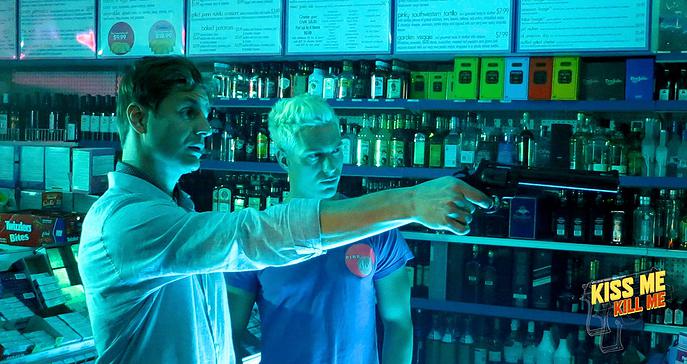Rule number one in gay cinema: Never fall in love with Brian Kinney.
Brian Kinney is the iconic champion of unbridled gay hedonism in Showtime’s Queer As Folk, desired by all and beholden to none. To fall in love with him is to fall in love with the uncaring avatar of sport-fucking and one-night-stands. Heartache generally ensues.
In the Casper Andreas film Kiss Me Kill Me, Brian returns, though times have changed. Now named Stephen, he is played once again by Gale Harold. Older but still coveted by all, Brian — er, Stephen — is now interested in marriage but still finds himself dancing to the chimes of love triangles. As is his wont, he eventually leaves everyone behind, but this time not in support of polyamorous ideals. Instead, he’s killed. Who did it? We don’t know. Regardless, the men who loved him are left with nothing but problems. The old rule still applies: Never fall in love with Brian Kinney.
One of his lovers, and the man he wanted to marry, is also our protagonist: the unfortunately-named Dusty. A high-drama boy-next-door type, his moods are as changeable as a time-lapse moon. One part bland, one part asshole, one part loveable, and two parts jealous, he loves Stephen, then kind of hates him, then kind of maybe kills him — or maybe he doesn’t kill him. We’re not entirely certain. This is where the topsy-turveydom of Kiss Me Kill Me begins.
As a farcical, sometimes-noir whodunit set in a gay milieu, Kiss Me Kill Me is a deceptively complex creature. It could have collapsed whilst attempting its genre-hopping gymnastics, but it somehow maintains footing. What saves it? First of all, it lives openly and honestly within its capabilities. Where more ponderous, self-important pictures like the neo-noir Brick try very hard to be what they aren’t, Kiss Me Kill Me succeeds effortlessly at being exactly what it is. Second, it benefits from a self-deprecating sense of humor. It never takes itself too seriously, and even periodically skewers itself, sometimes via a Statler-and-Waldorf-style lesbian couple that mocks other characters and generally takes the piss.
Kiss Me Kill Me doesn’t want to impress you. It wants to entertain you. And it will mostly succeed if you allow it. If you don’t buy in, then some of its jokes could misfire, and some of its topsy-turveydom could annoy. There are moments that made me wonder if it is really just stupid, but it isn’t stupid at all. It’s just contrived, and in the best way: openly, and without shame or ostentation. Watch it when you’re in the mood for contrivance and you’ll have a good time.
It reminds me somewhat of films by the Coen Brothers, chiefly Fargo and The Big Lebowski, where darkness meets wackiness, humor tempers the horrible, and character emerges from caricature. I don’t feel entirely certain of myself in writing this, but: if the Coens were all about campy West Hollywood intrigues, and if they were less high-minded about their art, then this is a picture they might have made.
While Kiss Me Kill Me may be reminiscent of the Coens’ work, it is not quite as sophisticated. Cops are a little too certain. Suspects are a little too forthright. Reactions are a little too histrionic. Yes, there is the obligatory moment when Dusty cries into the clothing of the deceased. Yes, there is the obligatory club debauchery scene. Yes, there is the obligatory drag queen. But somehow this sassy-cum-serious camp-cum-noir melange works. For every flawed moment, you’ll also find a gem. There’s that pleasingly unbecoming shot of a cum rag; and that moment when someone yells “Fuck you!” and flees, leaving a poof of feathers behind; and there’s that ending — the best worst final scene (and closing line) to come along in a while.
The cast is something of a delight, too. There are no flawed performances, and everyone hits the right notes at the right times — no simple achievement in a movie that features a sometimes dizzying array of tonal shifts. Look for Matthew Ludwinski’s shallow-but-real club toy Craigery; Yolanda Ross’s hard-boiled, blacksploitation-tinged cop Detective Riley; and Craig Robert Young’s multivalent psychotherapist Jeffrey Kinlan. In a smallish role worth mentioning, D.J. Pierce plays his drag persona Shangela, of RuPaul’s Drag Race fame, who in turn plays Jasmine, a hypnotist drag queen. You might detect the faintest echoes of Whoopi Goldberg in Ghost during Jasmine’s pivotal scene, when she helps Dusty navigate the depths of his amnesiac confusion. Spirit guide, give me the answers. Halleloo.
Dusty is arguably the biggest problem with Kiss Me Kill Me. Performed well by Van Hansis, he freaks out about the smallest things, and makes some exceedingly poor choices. Ultimately, though, he’s fine here as a foil for all of the other plot and character fireworks on display. Also, it’s entirely acceptable for a movie to have a rather bland protagonist, so long as it has an interesting antagonist. Kiss Me Kill Me succeeds in the antagonist department, a task that many big-budget comic book films have failed.
Final assessment? Kiss Me Kill Me is a likable whodunit that is neither all bad nor all good. It benefits from the best of what’s worst, and the worst of what’s best, about it — an odd sort of accomplishment, and a mildly guilty pleasure, that is definitely worthy of your time.
Kiss Me Kill Me comes out on DVD and VOD on 7 December, 2016.















